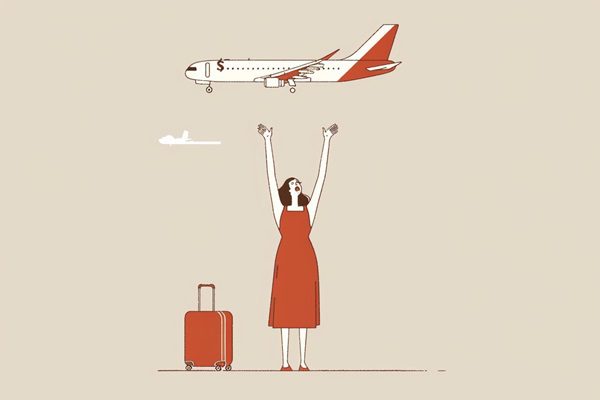 If you haven’t flown in a while, fasten your seatbelts. I’ve got good news — and bad news.
If you haven’t flown in a while, fasten your seatbelts. I’ve got good news — and bad news.
You’ve probably already heard the bad news because it travels faster than the speed of sound. Airfares are up. So are luggage fees. And we seem to have a problem with in-flight violence again.
But there’s more to the story; if you’re an occasional air traveller, you’ll want to get the big picture. You might be surprised by what you find.
First, the bad news about air travel in 2024.
Some of the changes have not been for the better. For example:
- Airfares are climbing. Cheap pandemic airfares are history. Average domestic roundtrip fares fell to $186 in May 2020, but they were back up to $261 by the beginning of this year—and they continue to climb.
- Checked baggage fees are soaring. All of the major airlines have recently raised their baggage fees. On domestic flights, a checked bag may cost as much as $35 (more if you wait until the last minute or your bag is overweight).
- Air rage is back. In-flight air rage hit record highs in 2021, primarily because of masking requirements. But the number of violent in-flight incidents remains high — this time, a combination of fuller flights and a continuing decline of civility. We’re on track to exceed 2020’s unruly passenger incidents.
But don’t despair. The air travel experience is changing in small ways—and potentially significantly.
What’s it like to fly now?
Let’s start with the air travel experience itself. Flights are fuller, and space is tighter than ever. You should congratulate yourself if you’re flying somewhere this spring or summer. You’re probably part of the busiest year in the history of air travel.
“Air travel has rebounded,” says Jason Block, CEO of WorldVia Travel Group. That puts a squeeze on regular passengers. If you’ve booked a no-frills economy ticket, you may face a higher risk of being bumped from your flight. So, if you have a little extra money, Block suggests buying a more flexible ticket. You’re still not bump-proof, but at least you’ll move up the list.
Smile for the TSA.
The passenger screening experience is different but not necessarily better. The TSA has new scanners that take your picture to verify your identity. New technology might also allow you to keep all your belongings in your bag and speed up screening—”might” being the operative word.
“The process is more inconsistent than ever,” says Andy Abramson, a frequent traveller and a communications consultant from Las Vegas. “Procedures change from airport to airport. In some cases, all you need is your boarding pass. You need your ID in others, and in others, nothing but your facial scan.”
Speaking of technology, many air travellers have raved about new onboard Wi-Fi capabilities. Airlines like Air New Zealand, Emirates and JetBlue include the price of Wi-Fi in their tickets, and the connections have just gotten better since the pandemic.
Your face is your boarding pass.
The TSA isn’t the only one using facial scans. Some U.S. airlines have started using facial scans instead of boarding passes, which is a little bit of an adjustment for passengers.
“I stood awkwardly in front of a camera, feeling like a contestant in a dystopian game show,” says Chris McGuire, a real estate broker from Birmingham, Ala.
A few months ago, Frankfurt became the first airport in Europe to adopt facial recognition fully. Other airports, including Tokyo and Dubai, also have face-scanning technology. If you haven’t flown in a while, you may not have to fumble for your boarding pass before you get on the plane.
I’ve used face-scanning technology on many occasions, and it usually works, but it can be slow. Getting through customs in Santiago, Chile, took a while, and the agent kept apologizing for the technology. So don’t forget to pack your patience.
No more ticket change fees.
Airline ticket change fees disappeared during the pandemic on U.S. airlines. So, if you have to change your flight, you won’t have to pay a $250 fee on top of any fare difference.
“That’s one of the most significant changes,” says frequent air traveller Bob Bacheler, the managing director of Flying Angels, a medical transport service. Airlines introduced more flexible booking and cancellation policies, allowing passengers to change or cancel flights without heavy penalties.
Bacheler thinks the fees will return eventually, and he’s right. If they do, airlines will call them something else—maybe a “convenience” fee.
You may board your flight differently.
“Some airlines are implementing new boarding procedures,” says Andy Palacios, vice president of growth and strategic partnerships for App in the Air. The most significant is United Airlines, which began boarding economy passengers with window seats before those with middle and aisle seats last fall.
Palacios recommends avoiding the general boarding mayhem by getting a credit card or earning elite status. Anything that gets you into the first boarding group can save you from gate-checking your carry-on or getting stuck in a crowd.
You have new rights, too.
If something goes wrong on your flight, you may find that your airline will do more for you. That’s because the Department of Transportation (DOT) regulates airlines and has been applying steady pressure on domestic airlines to improve customer service. (After all, taxpayers bailed out the airlines during the pandemic.)
Airlines now offer guaranteed meals, accommodations and ground transportation to and from a hotel when they’re at fault for a cancellation. (You can learn about your rights on the DOT’s Fly Rights website.)
The government is working on carving out more rights for air travellers, including more straightforward and honest pricing and minimum seat size. But it’s a work in progress.
Flying “feels different” now.
Passengers say it feels like something has shifted regarding air travel.
“Flying feels different,” says Robert Khachatryan, a frequent flier and founder of a freight forwarding service in La Crescenta, Calif.
He’s correct. It’s not just that customers have a few new rights, that the technology is upgrading, or even that boarding is a little different.
There’s a sense that something big lies just ahead. With people like Elon Musk teasing a Tesla that can fly and personal flying vehicles making headlines almost every day, there’s a feeling that flying is about to evolve significantly.
Air travellers have become disenchanted with commercial air travel, with its high fares, fees, long lines, and terrible customer service. Relief may not come from new rules to protect air travellers’ rights but from a fundamental change in the way we fly.
So, if flying feels different to you now, wait. You haven’t seen anything yet.
This is the first of a two-part series on the future of air travel. Next week: Flying cars. Yeah, we’re going to go there.
Written by: Christopher Elliott
Christopher Elliott is an author, consumer advocate, and journalist. He founded Elliott Advocacy, a nonprofit organization that helps solve consumer problems. He publishes Elliott Confidential, a travel newsletter, and the Elliott Report, a news site about customer service. If you need help with a consumer problem, you can reach him here or email him at chris@elliott.org.

